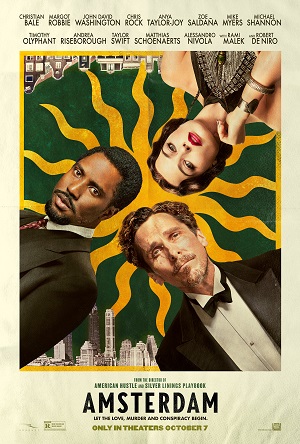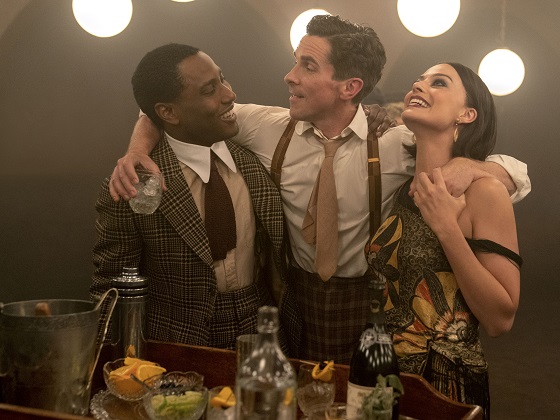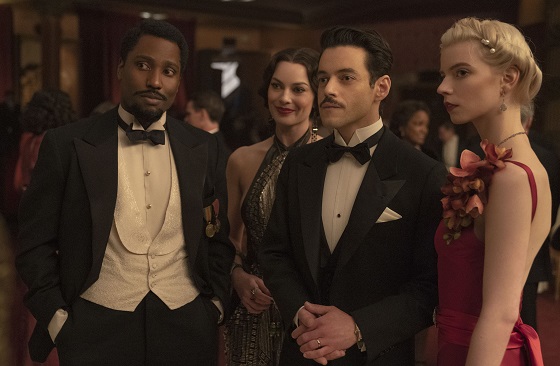

[Rating: Rock Fist Way Down]
In theaters Friday, October 7
A garish, hammy, unfocused kaleidoscope of quirky humor and half-assed proselytizing, Amsterdam is the butcher’s bill come due for not just one director, but an industry that keeps this glorified flotsam afloat. A soulless grab-bag of eccentric characters and plot notions scrambled together for maximum awards season effect, this is the kind of fake, manufactured movie that would be playing in the background of another, better film taking the piss out of an industry that should be better than this.
Set over a 14-year period that bounces back, forth, and in between 1919 and 1933, Amsterdam tracks the (mis)adventures of World War I buddies Harold (John David Washington) and Burt (Christian Bale), whose simultaneous wounding and convalescing bring them into the orbit of American ex-pat nurse, Valerie (Margot Robbie). The three recuperate together after the war in Amsterdam, where they establish a sort of relationship triad that proves to be the highpoint of all their lives. The real world and its responsibilities eventually pull the trio apart, though, with Valerie disappearing, and Harold and Burt returning to New York City to become a lawyer and doctor, respectively.
Years later, the sudden death of Harold and Burt’s wartime C.O. draw the pair into a desperate murder-mystery plot that put them in the crosshairs of the police, as well as mysterious forces that seem to be tugging the strings of it all. Although allies such as their wartime buddy, Milton (Chris Rock), and local mortician, Irma (Zoe Saldana), are able to provide some assistance, Harold and Burt have a whole host of character question marks to work through to get to the truth. These include NYPD Detective Hiltz (Alessandro Nivola), high society businessman Tom Voze (Rami Malek), his wife (Anya Taylor-Joy), and retired Marine General Gil Dillenbeck (Robert De Niro), among others.

Writer/director David O. Russell tries to weave all this mystery and political/social intrigue into a broader story that spans the gamut from the micro to the macro, speaking to not just the singular human condition, but the broader character of the United States and the world at large. There’s a lot of speeches in Amsterdam, with characters outright explaining their motivations, and by extension, the logic of the story itself. This is more than just a violation of cinema’s cardinal rule about showing instead of telling, but a disservice to the broader messages Russell is admirably trying to put across here.
There’s nothing wrong with a movie using strong characterization to point out the criminal hypocrisy of a supposedly “free” country criminalizing interracial relations, discarding its veterans, submitting to mob justice, or even attempting to install corporate rather than democratic leadership. The problem Amsterdam has is that it attempts to take a swing at all of this, and in so doing, succeeds at none of it. To make matters worse, the whimsical tone and winking bravura of the film’s presentation keeps the audience from sinking its teeth into any of these issues, giving Amsterdam a Wes Anderson directs Chinatown with the cast of Knives Out kind of vibe.
And make no mistake, there’s no shortage of top-tier, A-list talent trying and sell all of this. And none of the cast do more heavy lifting (and a better job with their load) than Bale, who is front-and-center for most of the film, and once again proves that he can act as the tide that lifts all other boats in a drought. Although the tone of the story around him shifts with all the chaos of a tiled room in an earthquake, he always keeps his feet, and injects the performance with an irresistible nebbish charm. Robbie is electric as the muse of not just the leads, but the thematic thrust of the picture itself, and is surpassed only by Rock as the actor that does the most with the least.

It is a mess, though: more a collection of scenes and monologues with tacked-on social issues added for a veneer or respectability. Many people have wondered aloud why such in-demand talent would lower themselves to work for a director with such a long laundry list of personal and professional issues, but the answer is right here on the screen. Every scene in Amsterdam seems crafted to give the actor something juicy to sink their teeth into, be it a monologue or a long-running characterization that allows for them to play with a host of fun ticks and maladies.
This is the kind of Golden Globes celebrity bait that puts statues on shelves, not because it is good, but because it allows a bunch of theater kids to do their version of Annie’s “Tomorrow” for 135 minutes. And if being obnoxious weren’t enough, it is just shoddy storytelling, as well. Elements of the various plots drive things for a time, then fade out of focus for the next intrigue or twist, robbing the story of any coherent tension or sense of world-building. The movie doesn’t seem to have the time or patience to follow up with each new set of complications for its characters (i.e., the cop who is on Burt and Harold’s trail, but not really, but is, and then isn’t again), and the effort’s overall momentum suffers for it.
But that doesn’t really matter for a movie like Amsterdam, which isn’t supposed to make sense or gel so much as provide attractive opportunities for Hollywood’s best and brightest to string together an awards campaign sizzle reel. Luckily for Russell and his cast, the Golden Globes are back this year, and since the standard practice of the HFP is to award statues in direct proportion to the quantity of top-line talent repping a movie, this one has a chance at accomplishing at least one of its goals.





Comments on this entry are closed.